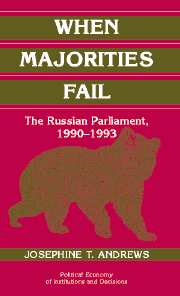Book contents
- Frontmatter
- Contents
- Acknowledgments
- 1 Introduction
- 2 Cycling in Action: Russia's Constitutional Crisis
- 3 Cycling and Its Consequences: A Theoretical Framework
- 4 Institutional Design and Implications for Majority Rule
- 5 Issue Dimensions and Partisan Alliances
- 6 The Structure of Preferences
- 7 Legislative Instability
- 8 The Dynamics of Agenda Control in the Russian Parliament
- 9 Implications of Disequilibrium in Transitional Legislatures
- References
- Index
5 - Issue Dimensions and Partisan Alliances
Published online by Cambridge University Press: 02 September 2009
- Frontmatter
- Contents
- Acknowledgments
- 1 Introduction
- 2 Cycling in Action: Russia's Constitutional Crisis
- 3 Cycling and Its Consequences: A Theoretical Framework
- 4 Institutional Design and Implications for Majority Rule
- 5 Issue Dimensions and Partisan Alliances
- 6 The Structure of Preferences
- 7 Legislative Instability
- 8 The Dynamics of Agenda Control in the Russian Parliament
- 9 Implications of Disequilibrium in Transitional Legislatures
- References
- Index
Summary
In the first two chapters, I argue that changes in the structure of deputy preferences transformed the Russian Parliament from a purposive vehicle for political and economic reform into the obedient dupe of an ambitious politician. As the key to why Russia's transitional parliament failed as a democratic, representative institution, it is important to investigate the origins of deputies' preferences as well as how and why they changed.
Philosophers and scholars have focused on two possible sources of the preferences of elected representatives; either the preferences of deputies reflect their ideology or they reflect the collective desires of the constituents who elected them. As philosophers and scholars have noted, either alternative has important implications for the meaning of representative democracy (Burke 1774; Fenno 1973, 1978). It seems likely that the preferences of deputies consist of a combination of (a) personal ideology and (b) attentiveness to constituent demands, and that these will exert greater or lesser influence depending on the strength of the deputy's personal ideology (Budge 1994; Ansolabehere, Snyder, and Stewart 2001) and the strength of the electoral connection (Mayhew 1974, Fiorina 1977, Strom 1990). In stable, long-lived democracies, in which elections to the national legislature have been held for decades or even generations, the electoral connection between citizens and representatives is strong. Voters reelect candidates who successfully represent their interests, and they reject candidates who do not (Fiorina 1981).
- Type
- Chapter
- Information
- When Majorities FailThe Russian Parliament, 1990–1993, pp. 106 - 139Publisher: Cambridge University PressPrint publication year: 2002

